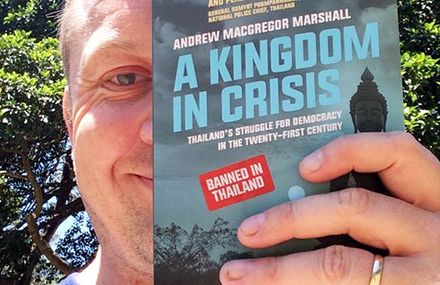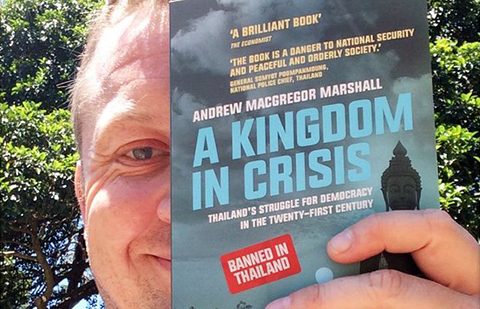
Andrew MacGregor Marshall holds up the second edition of his book a Kingdom in Crisis. Photo: @zenjournalist on Twitter
New Mandala co-founder Andrew Walker reviews A Kingdom in Crisis.
There is a long tradition in Western commentary on Asia pointing to the reprehensible behaviour of oriental despots.
Advocates for colonial expansion often built their case around the need to liberate the Asian masses from their rapacious, and sometimes unhinged, rulers. Andrew MacGregor Marshall’s A Kingdom in Crisis sits firmly within this orientalist tradition.
A Kingdom in Crisis provides a salacious chronicle of royal brutality and “murderous violence” in pre-modern Siam (p 53). Princes who fell out of favour were put in velvet sacks and beaten to death with sandalwood clubs (p 43); petty criminals were slow-roasted alive (p 53); the owners of dogs whose barking disturbed the king were “killed in the cruellest fashion on earth” (p 52); and unsuspecting maidens were arbitrarily sacrificed to meet the king’s superstitious whim (p 122). There were also “blood-curdling punishments” for those bold enough to engage in “immoral intercourse with a lady of the Palace” (p 51).
Palace intercourse — MacGregor Marshall shows us that there was an awful lot of it — was the prerogative of extraordinarily randy monarchs. Prasart Thong, who seized the throne in 1629, was a pervert, selecting the “prettiest maidens and daughters of the greatest men” (p 124) as his concubines! And even the scholarly Mongkut, released from his monastic sublimation at the ripe old age of 46, begat 82 children by 35 women in his “harem” (p 129).
Do not be misled by the imagery of the “land of smiles” MacGregor Marshall helpfully warns those who mistake tourism slogans for reality: Thais are very good at staging political theatre, but behind the scenes a violent and libidinous orient is lurking.
The core objective of A Kingdom in Crisis is to challenge Thailand’s royalist mythology.
In simple terms, the core myth is that the king is a unifying, integrating and benevolent force in Thai society. Drawing extensively on Thailand’s long royal history, MacGregor Marshall shows that, in fact, the monarch in Siam/ Thailand has been a powerhouse of intra-elite conflict, while at the same time providing an ideological figurehead to facilitate the oppression of the masses. The book’s far from flattering account of Thai history draws on the accounts of Westerners resident in pre-modern Siam (with surprisingly little critical reflection on how their vested interests may have shaped the shocking tales they tell), modern (and not so modern) scholars, popular tales, and, most originally, the WikiLeaks cables.
It certainly is a myth-busting tour-de-force showing how Thai kings, and the elites that surround them, have regularly generated political crises, which also reflect competition between narrow sectional interests. However, whether or not the book will achieve its myth-busting objective is hard to tell. Most readers, I suspect, will already be converts to MacGregor Marshall’s position. By contrast, those who subscribe to the royal mythology will probably be confirmed in their view that unsympathetic Westerners like MacGregor Marshall are determined to slander the royal institution.
The book’s central claim is that the current political crisis that has gripped Thailand since 2005 “is essentially a succession struggle over who will become monarch when King Bhumibol dies” (p 3). The hitherto “unacknowledged war of succession” (p 4) is the key to making “Thailand’s bewildering crisis … comprehensible” (p 5). Given the centrality, and boldness, of this claim, MacGregor Marshall has surprisingly little to say about it.
Part III of the book addresses “the secrets of the Thai succession” (p 105). MacGregor Marshall starts this section by categorically rejecting the conventional wisdom that Crown Prince Vajiralongkorn will take the throne following the passing of his father. He confidently declares that predictions of an orderly succession “are completely untrue” (p 109).
So what are the secrets that are revealed in these central chapters? From my reading there are three. First, that going back centuries, royal succession in Southeast Asia has been contested and often violent. Second, that elites have often attempted to manoeuvre weak kings onto the throne. Third, that Crown Prince Vajiralongkorn is unpopular and there are serious doubts held about his suitability for the throne.
All in all, very standard stuff that has been well known to even casual observers of Southeast Asia for a long time. Some readers may regard this as evidence that is compelling enough for MacGregor Marshall to dismiss as “completely untrue” the claim that Thailand’s royal succession is a done deal. I do not.
In the latter chapters of the book, which provide a very lively and readable account of the past 10 years of political crisis in Thailand, MacGregor Marshall makes further specific claims about the succession. He suggests that the “ruling class had long been confident that when the time came they would be able to keep Vajiralongkorn off the throne” (p 158) but that their optimism was “evaporating” (p 158) in 2005 as a result of the birth of the prince’s first son, and his close relationship with then-Thai Prime Minister Thaksin Shinawatra.
These favourable developments for Vajiralongkorn generated a climate of “apocalyptic dread among the elite” (p 159). Later, he reports that the “establishment” assumed that the 2006 coup was part of a plan to manage the succession (p 167) and that in 2007, the “elite secretively plotted” (p 170) about the succession and launched a campaign to damage Vajiralongkorn’s reputation. MacGregor Marshall also claims that the Queen, having previously supported Vajiralongkorn, decided to “freeze her son out of the royal succession, planning to reign as regent” (p 173). We are also told that the “army leadership also supported blocking the prince” (p 174).
These are all plausible claims, and they are consistent with rumours and commentaries that circulate online.
However, A Kingdom in Crisis presents no compelling evidence to back them up. In most cases no sources are cited. Of course, given the threat of Thailand’s oppressive lese majeste law, it is very reasonable not to cite specific people. But some indication of the nature and provenance of the evidence is called for, given the importance of the claims and the confidence with which they are made. More careful reference to sources may also have moderated the tendency to attribute specific motivations to very broadly defined social groups: the “ruling class”, the “elite” and the “establishment”.
In some cases reference is made to WikiLeaks material, but this is not compelling either. One cited cable refers to attempts to undermine the reputation of Vajiralongkorn’s consort, but the author of the cable only “assumes” that this has “implications” for the prince (p 170). Discussions between the US ambassador and various Thai elder statesmen who were critical of Vajiralongkorn are also cited. To account for the fact that these prominent Thais made no mention of a succession struggle, MacGregor Marshall declares that they “lied … to conceal their active efforts to sabotage the succession” (p 187). All in all, MacGregor Marshall’s evidence does not match his claims.
MacGregor Marshall’s preoccupation with the succession points to a broader problem with this book.
Despite its provocations and iconoclasm this is very much a royalist account of Thai history. Like Thailand’s royalists, MacGregor Marshall places the king at the heart of the Thai polity. In A Kingdom in Crisis, contestation over royal power is the engine room of 21st century Thai politics, as it has been over the past millennium (p 213).
The mass of people sometimes do feature, but they are peripheral to MacGregor Marshall’s central purpose. When they do enter into the narrative, it is as an undifferentiated mass of “ordinary people” who are struggling against the elite in pursuit of “greater freedom and a fairer society” (p 109).
This two-dimensional and a-historical model – a cut-throat elite ruling over a repressed population – is classic orientalism and contributes little to an understanding of the complex and cross-cutting social and economic forces that have brought Thailand to its contemporary political impasse.
Andrew Walker is Professor of Southeast Asian Studies at the ANU Coral Bell School of Asia Pacific Affairs, and co-founder of New Mandala.
This review was published in the December 2015 issue of the Institute for Southeast Asian Studies journal, Contemporary Southeast Asia. The second edition of ‘A Kingdom in Crisis’ is now available from Zed Books.
 Facebook
Facebook  Twitter
Twitter  Soundcloud
Soundcloud  Youtube
Youtube  Rss
Rss 